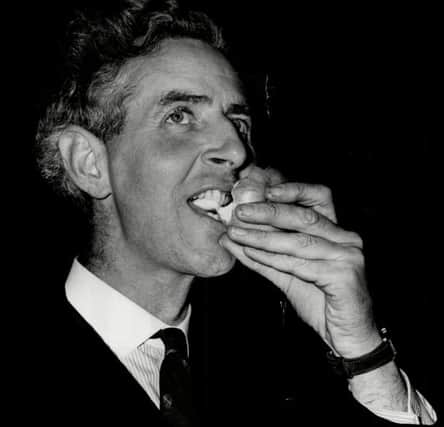Obituary: Sir John Wells, outspoken and often flamboyant one-time Conservative MP


Sir John Wells was an old school type of Conservative MP, public school and Oxbridge educated with a good measure of self-confidence. To the right of the party, he was conservative with a capital ‘C’, and although he portrayed himself as a buffoon with some of his eye-catching stunts, his rather laid-back façade masked a very serious and positive campaigner for the things that he felt really mattered, though these did ruffle feathers within his own party as well as elsewhere.
However, the tall, gangly Wells was later described as another “blameless backbencher who represented Maidstone for 28 years without achieving national office or making any national mark at all”. Nevertheless, he knew how to make his point. He championed matters agricultural and horticultural and was credited with a robust ability to grasp the complexities of key issues and argue local causes.
Advertisement
Hide AdAdvertisement
Hide AdAs an MP, he once noisily chomped on a Kentish apple on the green benches of the House of Commons during a speech by the Labour agriculture minister (in Prime Minister’s Questions) to highlight the harm being caused to the rural economy of cheap foreign imports from France, which he declared were not only subsidised, but also inferior to their English counterparts. It created much publicity but he was absolved of any wrongdoing by the Speaker. He later chaired his party’s backbench Horticulture Committee and persuaded ministers to move Covent Garden Market to Nine Elms.
On another occasion, Wells made a point about the importance of rural life to the UK by riding his horse to Parliament on budget day in 1968, whilst dressed for work in a bowler hat, pinstripe trousers and riding gloves. This was to protest against a proposed fuel tax rise.
He caused much annoyance after labelling some of his staunchest constituency party members “old bags” when they opposed his support for the export of live animals for slaughter, and claimed that 90 per cent of corporate aircraft were used for “dirty weekends”; he even brought proceedings to a halt when he spied newlyweds hand-holding and cuddling in the Strangers’ Gallery during a debate on police corruption. The couple were removed and later accused Wells of being a “fuddy-duddy”.
In one parliamentary session, he demonstrated disdain for ‘faceless bureaucrats’ when he called for cricketer, Ian Botham, and footballer, Kevin Keegan, to be put in charge of running parts of Britain should a nuclear catastrophe occur, warning that otherwise civil power could be in the hands of council chief executives and similar “nonentities”.
Wells’ more right-wing side came to the fore on a number of occasions too; in 1963 he met Spanish dictator General Franco; he later voted against Rhodesian oil sanctions and was one of a group that shouted down Quintin Hogg when he spoke in favour of Labour’s Race Relations Bill.
In 1962, he spoke vigorously against Leo Abse’s Bill to liberalise the homosexuality laws and then in 1964 described Commonwealth immigrants as “invaders”. Two years later, he urged Home Secretary, Roy Jenkins to confirm the birching ordered by prison visitors on a 19-year-old murderer for taking part in a riot in Maidstone prison; Jenkins declined.
Wells launched an unprovoked attack on Labour’s Scottish MPs in 1981 during a late-night debate, denouncing them as “pathetic, whingeing, snivelling wretches”. George Foulkes demanded his removal as a committee chairman, saying he had insulted Scotland after “sleeping through most of the debate”. Wells accused him of having no sense of humour. In 1984 during the miners’ strike, Wells objected to clergy in Kent asking worshippers at Harvest Festival Services to support the families of striking miners. “It would be a misappropriation of people’s offerings,” he declared. “The miners don’t have to be poor and needy.”
Born in 1925, John Julius Wells was the son of the Rev Reginald Wells, an Anglican clergyman and later schoolmaster, and his wife, Margaret (née Hodgson), a Dumfriesshire farmer’s daughter. John spent his formative years on his grandmother’s estate in Dumfriesshire, where he developed his passions for shooting and horticulture.
Advertisement
Hide AdAdvertisement
Hide AdHis first foray into politics was in 1953, when he was elected as an independent to Leamington Spa Borough Council. Soon after, he defected to the Tories, for whom he stood unsuccessfully in Smethwick, near Birmingham, in the 1955 general election. Having impressed enough, two years later he was selected for Maidstone, beating off numerous other candidates, including Margaret Thatcher, who was refused an interview owing to her sex, in the final round, despite her Kentish connections. Shortly after, she got Finchley, London.
Wells retained the safe Tory seat in 1959, following in the footsteps of a 19th-century ancestor, and retained it comfortably thereafter. He stood down just before Thatcher’s 1987 landslide. Conservative Ann Widdecombe replacehim. He was knighted in 1984 and made a Deputy Lieutenant of Kent in 1992. He was a Freeman of the City of London, and in 1977 Master of the Fruiterers’ Company.
In retirement, he enjoyed horticulture and continued his successful business; he exhibited at Chelsea Flower Show and also compiled a dictionary of plant names and ran his own game shoot in Kent.
Wells married Lucinda Meath-Baker in 1948 and they had four children - Andrew, Oliver and Henrietta and Julia. His wife died in 2013. Following a fall last November which broke his hip, he spent six weeks in hospital but his health deteriorated thereafter.
Martin Childs